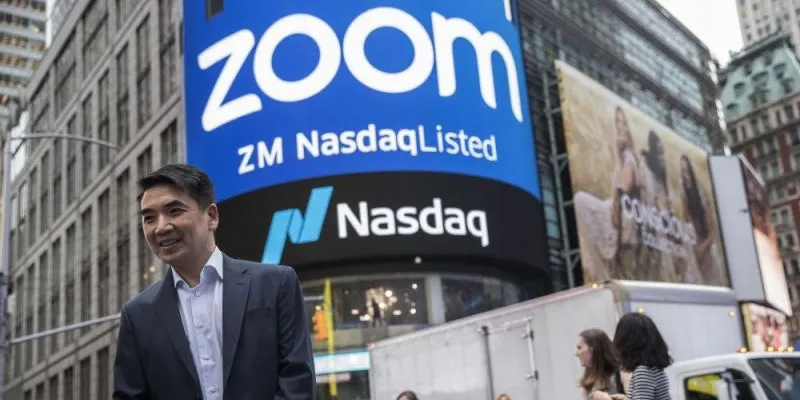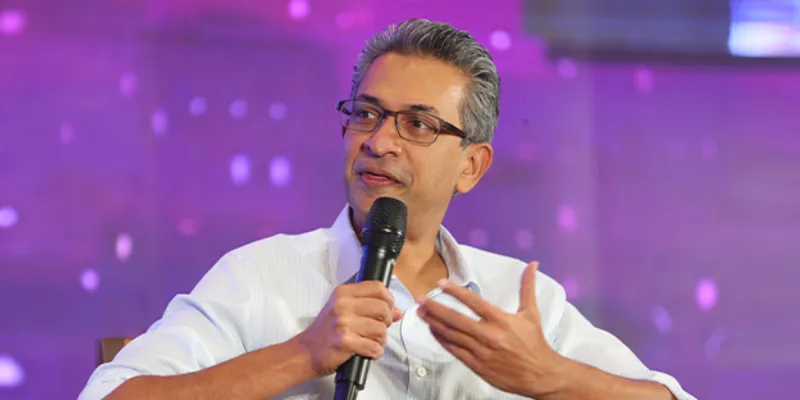India is Zoom's second-largest market, Founder Eric Yuan shares at TiE Delhi event
Zoom Founder Eric Yuan was in conversation with Sequoia India MD Rajan Anandan, where he spoke about the today and tomorrow of video communication.
In the keynote session of India Internet Day 2020 organised by TiE Delhi-NCR, Zoom Founder and CEO Eric Yuan told Sequoia India Managing Director Rajan Anandan that India is the company's second-largest market in the world (largest outside the US).
Zoom, which went from 10 million DAUs in December 2019 to 300 million DAUs in April 2020, counts a significant chunk of the new user growth from global markets.

Rajan Anandan in conversation with Eric Yuan on India Internet Day 2020 organised by TiE Delhi-NCR
Anandan, who is also TiE Delhi-NCR President, commended Eric for building an "extraordinary product" where people are spending most of their waking hours now.
Eric, who was one of the first 20 hires at WebEx (later acquired by Cisco) in 1997, spoke of the inspirations behind Zoom that has gone on to redefine video conferencing.
He shared,
"I was at Cisco WebEx till 2011, and I didn't see a single happy customer there. WebEx wasn't a beautiful video experience. Users wanted to have a [simple] video collaboration experience in future."
Legend has it that when Eric pitched a smartphone-focussed video conferencing tool at Cisco WebEx, the idea was turned down.
"My friends told me to start anything except another video conferencing company because the market was already crowded. But I wanted to build a next-gen product. So, I trusted my gut and followed my dream," he revealed.

Zoom Founder Eric Yuan
Eric left Cisco WebEx in 2011 to launch Zoom with the primary goal of "delivering happiness" to customers.
"When we started Zoom, we knew that video-first tech would become mainstream in future. So, we had to get the architecture right. If we got that right, we would only need to leverage servers like AWS or Oracle Cloud to scale up," he explained.
With NASDAQ-listed Zoom becoming the hottest Silicon Valley startup this year, the founder has added close to $10 billion to his personal fortune. Eric is currently worth $13.6 billion, according to the Bloomberg Billionaires Index.
How COVID-19 changed Zoom's focus
For almost nine years, Zoom was focussed on business and enterprise customers. However, things turned dramatically with the coronavirus outbreak.
With the widespread shutting down of schools, colleges, and organisations across the world, the demand for remote collaboration tools hit the roof.
Eric said,
"Earlier, we were focussed on businesses. The pandemic completely changed our user base dynamics. We are doing all we can to learn about the new use cases, and taking actions more quickly now."

"The lesson in this is that no matter what you do, you have to listen to customers carefully to understand why they are using your service," he added.
The founder also admitted that Zoom did make a few "mistakes" when it came to security and privacy of the platform — an issue it continues to grapple with.
He elaborated,
"We built a lot of security features for our enterprise customers. But, we had never served for K-12 schools before. These K-12 schools don't have IT teams. They do not know there are many security features in the product. What we realised is that not only should we offer the service but also play the role of an IT team for these schools and first-time Zoom users."
"The lesson learnt is that you may make a small mistake, but it will take a long time to change the perception given your size," Eric added.
In the aftermath of the pandemic, Zoom opened up its platform for free to K-12 schools in 25 countries, including India. Eric said, it was a part of the company's "CSR" duties.
The future of video communication
Almost all sectors of the industry believe that remote communication will continue to be the "new normal" even after the pandemic.
Zoom already caters to, what Anandan called, "all of life's use cases" — learning, work collaboration, health, entertainment, marriages, and more.
He said,
"Every decade we see an extraordinary company that becomes a generational company, and it all starts with a simple idea - to build what users love. But what is the future of video communication?"

Rajan Anandan, Managing Director, Sequoia India
Eric said that video communication will become more "intimate" and close to physical experiences in future. Zoom too is working towards adding new features.
Describing the future of video conferencing, the founder said,
"AI-led real-time language translation features will be available in the future. Other things like intimacy, shaking hands, giving hugs, smelling the coffee... the experiences of a physical meeting space will be the future of [video conferencing]. We are not there yet. But we want to make sure that Zoom can deliver the same or a better experience than a face-to-face meeting."
Eric also underscored the importance of having a "local strategy" in global expansion plans. Zoom, which recently announced the opening of a new technology centre in Bengaluru, is looking to ramp up its India operations.
Anandan highlighted that India is the largest market for most US-based tech companies. Is Zoom likely to launch any India-first products (a la Google Pay)?
Eric said, "We want to become more global, but we cannot do that on our own. That is why we are inviting third-party developers to build solutions on the Zoom marketplace."
"We got to have a local strategy. That is the direction we will go," he added.
Edited by Megha Reddy






![[App Fridays] Zoom rival Cisco WebEx becomes India’s #2 virtual meeting tool amid coronavirus](https://images.yourstory.com/cs/2/dc9aa1302d6c11e9aa979329348d4c3e/AppFridayCiscoWebex-02-1587645717512.png?fm=png&auto=format&h=100&w=100&crop=entropy&fit=crop)
![[App Fridays] Education app Google Classroom zooms ahead of BYJU's, Vedantu as coronavirus shuts schools](https://images.yourstory.com/cs/2/dc9aa1302d6c11e9aa979329348d4c3e/AppFridayGoogleclassroom-011-1586353802574.png?fm=png&auto=format&h=100&w=100&crop=entropy&fit=crop)




